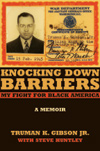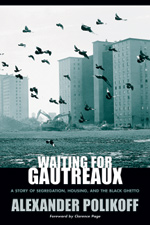|
||
      |
Peer Review ::
On the shelf
 Knocking
Down Barriers: My Fight for Black America, by Truman K. Gibson Jr.,
PhB’33, JD’35, with Steve Huntley, Northwestern University Press,
2005. As a civilian aide to the War Department during WW II Gibson played
a critical role in American race relations, negotiating with civil-rights
leaders and the Truman Administration to desegregate the U.S. armed forces.
He was the first African American awarded the Presidential Medal of Merit.
His memoir—an intimate account of military and civil-rights history—chronicles
his struggle in Washington and later career as a boxing promoter who helped
to usurp white control of professional sports.
Knocking
Down Barriers: My Fight for Black America, by Truman K. Gibson Jr.,
PhB’33, JD’35, with Steve Huntley, Northwestern University Press,
2005. As a civilian aide to the War Department during WW II Gibson played
a critical role in American race relations, negotiating with civil-rights
leaders and the Truman Administration to desegregate the U.S. armed forces.
He was the first African American awarded the Presidential Medal of Merit.
His memoir—an intimate account of military and civil-rights history—chronicles
his struggle in Washington and later career as a boxing promoter who helped
to usurp white control of professional sports.
Diagnoses in Assyrian and Babylonian Medicine, by JoAnn Scurlock, AB’75, PhD’88, and Burton R. Andersen, University of Illinois Press, 2005. Breaking the barrier that has long obscured the medical know-how of early Mesopotamia, cuneiformist Scurlock and medical expert Andersen analyze ancient medical texts. Culled from texts used to train physicians, the comprehensive volume gives insight into ailments and experimental medicine and treatment methods from Ashur, Babylon, and Nineveh—a medical sophistication not seen again until the 19th century.
 Calculating
Credibility: How Leaders Assess Military Threats, by Daryl G. Press,
AB’92, Cornell University Press, 2005. When it comes to predicting
foreign policy, past behavior may be overrated. Press, a government professor
at Dartmouth, analyzes the decision-making processes behind the Korean and
Vietnam Wars, pre-WW II crises in Europe, and the Cuban Missile Crisis.
He finds, contrary to conventional wisdom, that backing down during a crisis
has little impact on a state’s future credibility. When facing immediate
conflict, leaders are more likely to gauge an opponent’s threat by
how much power the state has and the interests it is currently pursuing
than by delving into the past.
Calculating
Credibility: How Leaders Assess Military Threats, by Daryl G. Press,
AB’92, Cornell University Press, 2005. When it comes to predicting
foreign policy, past behavior may be overrated. Press, a government professor
at Dartmouth, analyzes the decision-making processes behind the Korean and
Vietnam Wars, pre-WW II crises in Europe, and the Cuban Missile Crisis.
He finds, contrary to conventional wisdom, that backing down during a crisis
has little impact on a state’s future credibility. When facing immediate
conflict, leaders are more likely to gauge an opponent’s threat by
how much power the state has and the interests it is currently pursuing
than by delving into the past.
And They All Sang: Adventures of an Eclectic Disc Jockey, by Studs Terkel, PhB’32, JD’34, The New Press, 2005. Pulitzer Prize–winning oral historian Terkel returns to his first love—music. This compilation of 40 interviews, drawn from his 1945 radio program The Wax Museum, features reflections and observations from musicians, singers, and composers as diverse as rock-and-roller Janis Joplin, who reflects on her teen years listening to Leadbelly, and sitar virtuoso Ravi Shankar, who recounts meeting the Beatles in 1966.
 A
Man Without a Country, by Kurt Vonnegut, AM’71, Seven Stories
Press, 2005. Vonnegut’s latest collection of essays, written over
the past five years, many published in the alternative magazine In These
Times, applies the 82-year-old’s distinctive misanthropy—and
his art—to the “psychopathic personalities” of the Bush
Administration and the general morass of contemporary American life. “Human
beings, past and present,” he mourns, expounding on the country’s
environmental carelessness, “have trashed the joint.”
A
Man Without a Country, by Kurt Vonnegut, AM’71, Seven Stories
Press, 2005. Vonnegut’s latest collection of essays, written over
the past five years, many published in the alternative magazine In These
Times, applies the 82-year-old’s distinctive misanthropy—and
his art—to the “psychopathic personalities” of the Bush
Administration and the general morass of contemporary American life. “Human
beings, past and present,” he mourns, expounding on the country’s
environmental carelessness, “have trashed the joint.”
Knitting for Dogs: Irresistible Patterns for Your Favorite Pup—And You! by Kristi Porter, AB’91, Fireside, 2005. With 20-plus designs and patterns for knitting, monogramming, and decorating canine couture, Knitting for Dogs is geared toward both novice and professional knitters. From fringed ponchos to punk-rock collars, each creation comes with full instructions and color photos.
Victory in Tripoli: How America’s War With the Barbary Pirates Established the U.S. Navy and Shaped a Nation, by Joshua E. London, AB’98, Wiley, 2005. Threats to early America’s stability were both internal and external. While states struggled to build cohesive national unity, Barbary pirates from North Africa preyed on merchant vessels, capturing and enslaving American seamen. London explores how these high-seas battles came to define our earliest military developments and diplomatic relations.
 Fenway
Fiction: Short Stories From Red Sox Nation, by Adam Pachter, JD’96,
Rounder Books, 2005. Through short stories and play and novel excerpts,
Patcher brings together the first all-fiction anthology ever devoted to
a sports team. Inspired by the Boston Red Sox, the 17 stories include what
happens when an academic is suddenly called to pitch for the team and an
alternative history of the 2004 World Series.
Fenway
Fiction: Short Stories From Red Sox Nation, by Adam Pachter, JD’96,
Rounder Books, 2005. Through short stories and play and novel excerpts,
Patcher brings together the first all-fiction anthology ever devoted to
a sports team. Inspired by the Boston Red Sox, the 17 stories include what
happens when an academic is suddenly called to pitch for the team and an
alternative history of the 2004 World Series.
Waiting for Gautreaux: A Story of Segregation, Housing, and the Black Ghetto, by Alexander Polikoff, AB’48, AM’50, JD’53, Northwestern University Press, January 2006. In the ’50s and ’60s, the Chicago Housing Authority built more than 10,000 public-housing units; all but 63 were located in low-income, racially segregated areas. In his memoir Polikoff, the principal lawyer in Gautreaux v. CHA and HUD, explains how he took the disparity to the Supreme Court, setting a precedent for ending the discriminatory policies of public-housing officials nationwide.